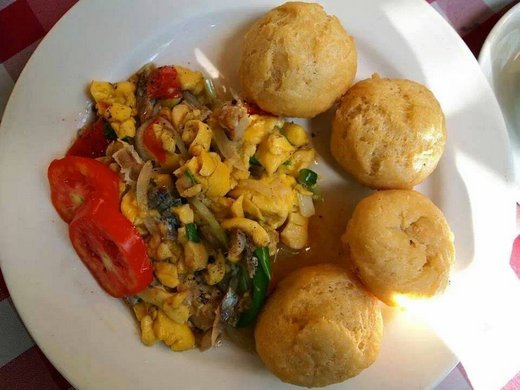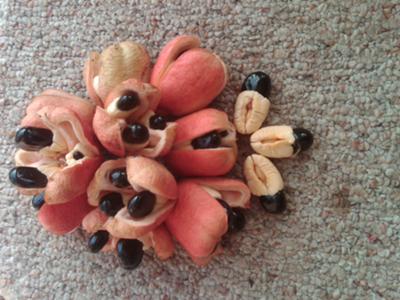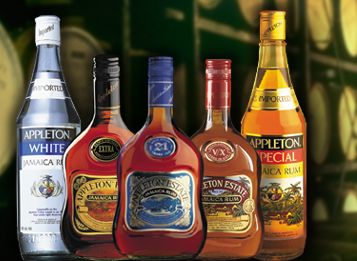Subscribe for all my updates and don't miss a thing! Sign me up!
6 Historical Jamaican Food Facts
by Kesha Stewart | Associate Writer

Photo: National Dish of Jamaica - Ackee and Saltfish
Many of the foods we eat here in Jamaica are not indigenous to the island. They came from other countries and we have granted them citizenship and made them a part of our cuisine; some have even been elevated to the status of national symbols. Can you guess which foods these may be? If you thought of ackee and breadfruit then you're right. Today you'll be reminded of those you knew and meet a few more.

Photo: Jamaican Ackees
- Ackee
Nowadays we find this in cans on supermarket shelves locally and overseas. Locally we see it on makeshift roadside stands, on crude stalls in our local markets and on trees in our backyards. We call it ackee and it occupies the elevated position of being one part of the national dish. But how did ackee reach our shores? It is believed that the ackee, scientifically named ‘Blighia sapida’ in honour of Captain Bligh of the Bounty, was brought to Jamaica courtesy of our enslaved West African forefathers. By 1798 it was to be found as an exotic plant in homes in St. Andrew. At present ackee plants large and small flourish in diverse parts of the island. They are closely watched and as soon as they begin to open up they are picked and prepared with its companion saltfish. This is served lavishly as a breakfast delight with fried johnnycake, plantains or breadfruit (freshly roasted or fried) or even with ground provisions. Some locals have even ventured to make ackee and saltfish patties. - Saltfish
By law, in the times of slavery, the slave owner was required to provide the enslaved people with salted (preserved) meat. Codfish was an inexpensive way to meet this requirement. But how did the slave owners get this saltfish? Well, my friends, it was during the late 1500's Dutch traders with a taste for Caribbean sugar, molasses and rum traded salt-preserved Cod with Jamaica, Haiti and Barbados. So that is how a product produced in the North Atlantic could make its way to jamaica to join hands with ackee and they are now happily married as our national dish.
- Breadfruit
The jury is still trying to decide which parish in Jamaica has the best breadfruit. Some believe it's Portland, others say Westmoreland and every parish in between. Breadfruit is widely grown in varieties named for their shape, size, texture or colour. As such, there is white heart, yellow heart, banjam and even cassava breadfruit. Some varieties are reportedly better for roasting while others are better for boiling. Well, I don't know. Maybe you can help the jury but what I do know is that breadfruit is a very popular staple here in Jamaica. It was Captain Bligh of ackee fame, on his second voyage to Jamaica in 1793, who brought some 350 breadfruit trees which were planted in the Hope Botanical Gardens in Kingston and government botanical gardens in other parishes. They were intended to be a cheap food source for slaves, however, it was grossly unpopular for the first fifty years and was only good enough to be fed to the pigs around. The attractive trees, which lasted for a very long time, needed little care.
Breadfruit may have struggled to find acceptance here but when it was finally accepted it found itself in lowly and stately kitchens island-wide. It appeared on plates in various forms: boiled, roasted, fried, baked. Even being elevated to dessert status when it became a part of puddings. I tell you breadfruit is now in punches, wines, made into chips, made into fritters. Made into flour and incorporated in salads (similar to how potatoes are used). Did you know that the blossoms are used to make tasty preserves? Breadfruit is one of the foods most requested by Jamaicans in the diaspora community? Breadfruit is definitely not being fed to the pigs.
- Black and White Pepper
Black pepper is a very popular seasoning and home remedy in Jamaica. But did you know that black pepper comes from a plant? Yes, it does. We can tip our hat to Mr Thomas Hibbert who brought the first pepper plant to Jamaica. He took it from the East Indies in 1787. There is both black and white pepper but black pepper is the most popular on the island. Now here is what I definitely didn't know, both black and white pepper are made from the berries of the black pepper tree; black pepper comes from the unripe berries and white pepper from berries with the skin removed.
- Ginger
It's been 494 years since the ginger plant (Zingiber Officinale), originally from the orient, was introduced by the Spanish to Jamaica. Like many things, Jamaica can take the best and make it better. I say this because Jamaica is now reputed to produce the finest ginger in the world and we now export this product. It is used mainly to flavour puddings, cakes, sweets, sorrel drinks, and to make ginger beer and teas. Ginger has curative properties particularly stomach disturbances. Ginger is a main ingredient in the preparation of jerk meats.
Photo: Jamaican Rum - Rum
Well, you already know that Jamaica has the most bars per square mile so naturally, we should have a strong reputation in the rum market. As a matter of fact, we are producers of the best rum. Rum is a by-product of sugar. It was introduced to the Caribbean by the English colonizers first in Barbados in the early 17th century. Did you know that rum was originally referred to as “kill devil'' or rum Bullion? Gradually it was perfected in the 18th century in...where else? Jamaica.
Much can be said about rum here on the island. It is closely linked to piracy, wakes, dominoes and many other traditional and non-traditional get-togethers. Rum has transcended generations and is considered to be more versatile than other alcoholic beverages such as gin and vodka. There are several respected rum producers in Jamaica but some obviously stand out more than others. There are many types and varieties of rum around, however, Jamaica has the widest range of any country in the world.
I also recommend you read Foods Eaten In Jamaica The Favorites & The Traditional.
Regards,
KS
References:
- National Library of Jamaica, https://nlj.gov.jm/
- Jamaica Information Service, https://jis.gov.jm/
Editor's Note
Don't hesitate to submit your questions here! With well over 2000 questions already answered, chances are we can assist :-)
New! Get My Latest Book👇🏿
|
You asked, I've answered! You no longer need to save for months or years, to enjoy paradise! I spilled the beans! sharing my top tips on finding cozy accommodations and secret gems, only the way a native could! Click Here to pick it up on my e-store and start saving now! |
See The Best Of Jamaica - In Videos!
|
My channel reaches over 140,000 subscribers worldwide and has leveraged over 11 million views, sharing, what I call 'The Real Jamaica'. Subscribe today and join our family of viewers. |
Read More ...
New! Experience The REAL Jamaica!
Book Your Private Tour here and experience Jamaica the way we (locals) do!
P.S. Didn't find what you were looking for?
Still need help?
Click Here to try our dependable and effective Site Search tool. It works!
Or, simply click here and here, to browse my library of over 500 questions and answers! Chances are someone already asked (and got an answer to) your question.





